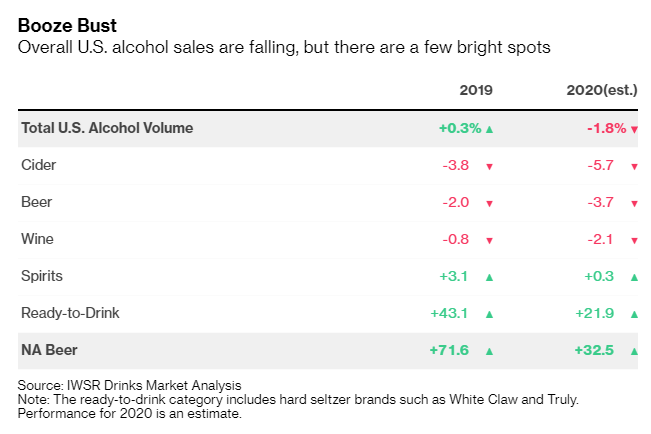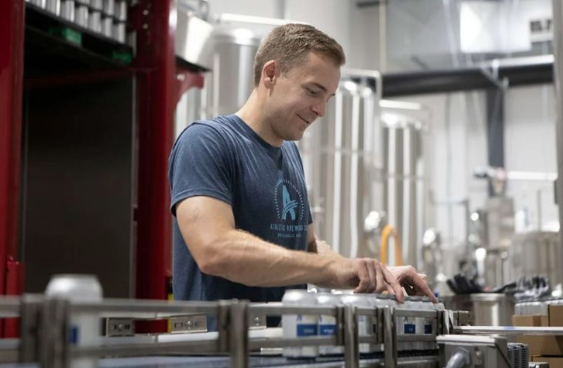Americans Are Boozing Less Than Originally Thought During The Pandemic
Believe it or not, people are actually drinking less now that they are quarantined.
What many thought would be an inevitability - people who are forced to stay home would start hitting the bottle more than usual - has actually turned out to be just the opposite. People are certainly buying more booze to stock themselves up at home, but this doesn't offset the "gaping hole" from restaurants and bars, according to Bloomberg.
In fact, global alcohol consumption isn't expected to hit pre-Covid levels until 2024.

Pandemic leading to PTSD
Recall, we wrote in April 2019 that Gen Z would likely ditch alcohol and become the "ultimate" marijuana consuming generation. The business of booze was already dealing with these types of headwinds heading into the pandemic. There is concern in the industry that even post-pandemic, Americans will continue to cut back on their alcohol consumption.
Mark Meek, Chief Executive Officer of IWSR Drinks Market Analysis, said: “The pandemic is set to cause a deeper and more long-lasting after-effect to the global drinks industry than anything we’ve experienced before. In many ways, 2019 was perhaps the last ‘normal’ year for the drinks industry.”

The U.S. craft beer boom that has driven the industry for the last decade has given way to hard seltzers like White Claw. And non-alcoholic beer continues to sell well. Non-alcoholic beer is forecasted to grow by 33% this year despite an overall 3.7% drop in the beer category. This is due to brewers putting more time and focus into N/A drinks that retain the qualities of regular beers.
Jonathan Bennett, executive vice president for merchandising and supply chain for Total Wine, said: “You can have the amazing taste experience of an IPA, but it just doesn’t have the alcohol in it.”
“If this is going to be the end of alcohol, we’re going to be great at it,” Bennett said about non-alcoholic options and low calorie drinks like hard seltzers.

Non-alcoholic brewer Athletic Brewing Co. says its sales this year have already passed 2019. CEO Bill Shufelt said: “It’s an acceleration of a movement that was already in place toward healthier lifestyle. Sure, many Americans might have drank heavily early on during shelter-in-place orders, but being hungover at home probably got old pretty fast.”
Many athletes still drink Michelob Ultra (BUD), which started the low-carb beer trend back in the early 2000's. But other entrants into the niche, like WellBeing Brewing, are starting to pitch their drinks as perfect after sports. WellBeing even makes a beer with electrolytes, like those found in Gatorade.
Jeff Stevens, founder of WellBeing and a recovering alcoholic, said: “I was just out all the time, and there was never anything to drink. None of the choices, even then, were good. And it was like: Why isn't anyone doing craft beer in this space?”
Disclosure: Copyright ©2009-2020 ZeroHedge.com/ABC Media, LTD; All Rights Reserved. Zero Hedge is intended for Mature Audiences. Familiarize yourself with our legal and use policies every time ...
more



I find this hard to believe. Every conversation I have people casually bring up how much more they have been drinking now. Social media is nothing but seltzer’s and pool days. I don’t buy it.
I also found this very surprising. But then why are sales falling?
Every convenience store I've visited has said beer is flying off the shelves daily.
Odd. I wonder where the disconnect is. Sales figures don't lie. Though perhaps its a case of confirmation bias. We assume that in tough times people drink more, so we look for things to support that.
Maybe we are using two separate metrics, i.e. small sample size polling of retail stores (in multiple regions) and a report on total aggregate sales. Retail sales are likely much higher and taking up much of the lost sales volume from closed sporting events and closed bars. -3.x% total sales year over year isn't bad at all considering the pandemic.
I thought liqueur sales always increased during difficult times. Why would know be any different?